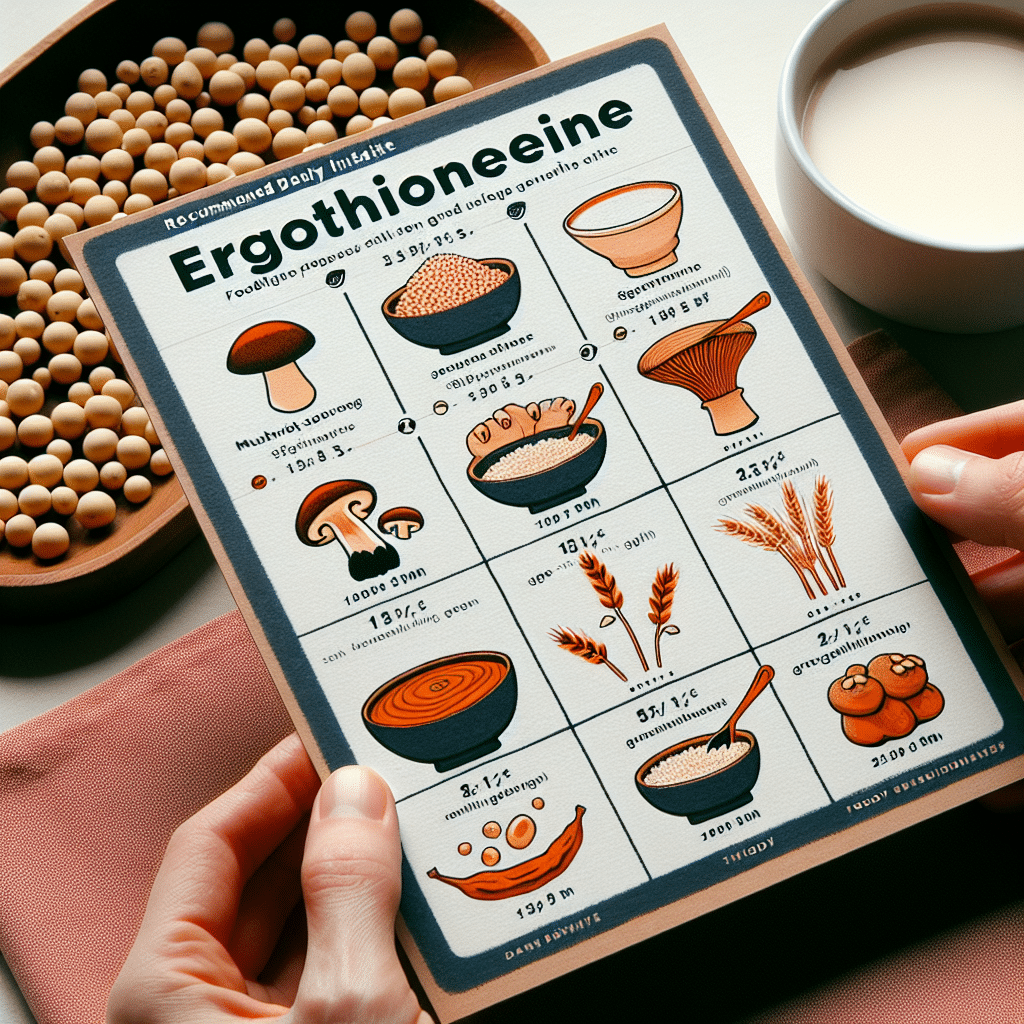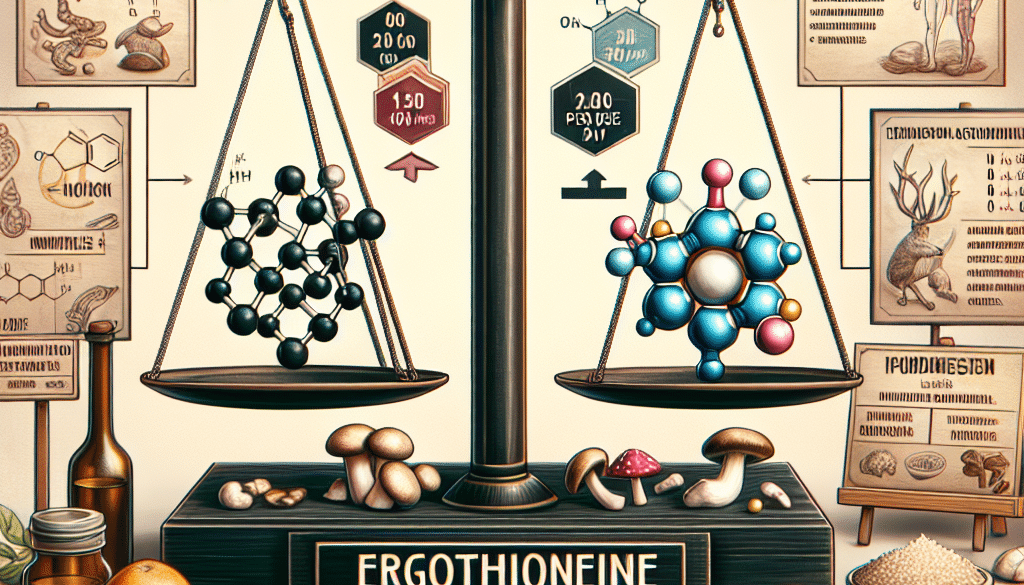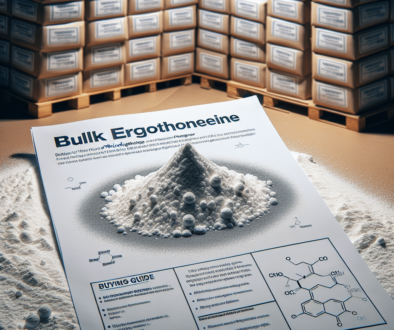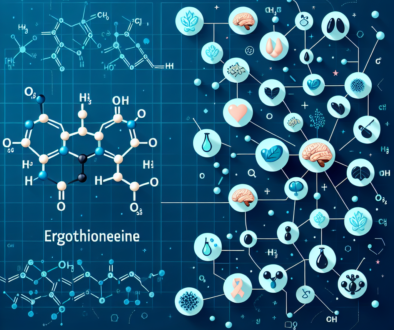How Much Ergothioneine Per Day? A Guide
-
Table of Contents
- Ergothioneine Intake Guide: How Much Do You Need Daily?
- Understanding Ergothioneine
- The Role of Ergothioneine in Health
- Recommended Daily Intake of Ergothioneine
- Research-Based Suggestions
- Considerations for Supplementation
- Sources of Ergothioneine
- Case Studies and Statistics
- Maximizing Ergothioneine Absorption
- Conclusion: Balancing Ergothioneine Intake
- Enhance Your Diet with ETprotein’s High-Quality Protein Products
Ergothioneine Intake Guide: How Much Do You Need Daily?

Ergothioneine, a naturally occurring amino acid, has been the subject of increasing scientific interest due to its potential as an antioxidant and its role in protecting cells from oxidative damage. As research continues to uncover the benefits of ergothioneine, many are left wondering how much of this compound they should be consuming daily to reap its health benefits. This article aims to provide a comprehensive guide on the recommended daily intake of ergothioneine, its sources, and its significance in human health.
Understanding Ergothioneine
Ergothioneine (EGT) is a sulfur-containing amino acid found in various dietary sources, particularly in mushrooms, certain meats, and grains. Unlike other amino acids, ergothioneine is not used to build proteins but rather serves as a potent antioxidant. It is unique in that it has a specific transporter in the human body, indicating its importance in biological processes.
The Role of Ergothioneine in Health
Research has linked ergothioneine to a variety of health benefits, including:
- Protection against oxidative stress
- Anti-inflammatory properties
- Potential neuroprotective effects
- Support for immune function
- Possible anti-aging effects
Given these potential benefits, understanding the optimal daily intake of ergothioneine is crucial for those looking to incorporate it into their diet for health purposes.
Recommended Daily Intake of Ergothioneine
As of my knowledge cutoff in 2023, there is no officially recommended daily allowance (RDA) for ergothioneine. However, studies have suggested various intake levels based on observed health benefits and dietary patterns. It’s important to note that the optimal amount of ergothioneine may vary depending on individual health status, diet, and lifestyle.
Research-Based Suggestions
Some studies have estimated that the average dietary intake of ergothioneine ranges from 2 to 3 milligrams per day in Western countries. However, populations with diets high in mushrooms, such as in Japan, may consume upwards of 4 to 5 milligrams per day. These levels are associated with positive health outcomes, but more research is needed to establish a definitive guideline.
Considerations for Supplementation
For those considering ergothioneine supplementation, it is essential to consult with a healthcare provider. Supplements can provide a higher dose of ergothioneine, which may be beneficial for certain individuals, but it’s crucial to ensure that supplementation is safe and appropriate for your specific health needs.
Sources of Ergothioneine
Ergothioneine can be found in a variety of dietary sources. The most notable include:
- Mushrooms (especially porcini, oyster, and shiitake)
- Black and red beans
- Oats and barley
- Certain meats (liver and kidney)
Incorporating these foods into your diet can help increase your ergothioneine intake naturally.
Case Studies and Statistics
Several studies have highlighted the importance of ergothioneine in diet and health. For example, research has shown that higher mushroom consumption, a primary source of ergothioneine, is associated with a lower risk of mild cognitive impairment. Additionally, population studies have found correlations between ergothioneine levels and reduced incidence of chronic diseases, though causation has not been firmly established.
Maximizing Ergothioneine Absorption
To maximize the benefits of ergothioneine, it is important to consider factors that influence its absorption:
- Combining ergothioneine-rich foods with vitamin C may enhance absorption.
- Cooking methods can affect ergothioneine levels in food, with some studies suggesting that certain cooking techniques may help retain more ergothioneine.
Conclusion: Balancing Ergothioneine Intake
In conclusion, while there is no established RDA for ergothioneine, aiming for a daily intake of 2 to 5 milligrams through diet or supplementation may provide health benefits. As research evolves, these recommendations may be refined. It’s important to consult with healthcare professionals before making significant changes to your diet or beginning supplementation.
Enhance Your Diet with ETprotein’s High-Quality Protein Products
If you’re looking to boost your protein intake alongside ergothioneine, ETprotein offers a range of high-quality protein products that can complement your dietary needs. Their selection includes organic and non-GMO protein powders derived from various plant sources, ensuring you have access to clean, allergen-free nutrition.
ETprotein’s offerings are not only rich in protein but also include L-(+)-Ergothioneine in pharmaceutical, food, cosmetic, reference, and standard grades. With purity levels over 98% and 99%, you can trust the quality and efficacy of their products.
Whether you’re involved in the nutraceutical, pharmaceutical, cosmeceutical, or food and beverage industries, ETprotein can meet your protein and ergothioneine needs. Contact them at sales(at)ETprotein.com to learn more or to request samples.
About ETprotein:
ETprotein, a reputable protein and L-(+)-Ergothioneine (EGT) Chinese factory manufacturer and supplier, is renowned for producing, stocking, exporting, and delivering the highest quality organic bulk vegan proteins and L-(+)-Ergothioneine. They include Organic rice protein, clear rice protein, pea protein, clear pea protein, watermelon seed protein, pumpkin seed protein, sunflower seed protein, mung bean protein, peanut protein, and L-(+)-Ergothioneine EGT Pharmaceutical grade, L-(+)-Ergothioneine EGT food grade, L-(+)-Ergothioneine EGT cosmetic grade, L-(+)-Ergothioneine EGT reference grade and L-(+)-Ergothioneine EGT standard. Their offerings, characterized by a neutral taste, non-GMO, allergen-free attributes, with L-(+)-Ergothioneine purity over 98%, 99%, cater to a diverse range of industries. They serve nutraceutical, pharmaceutical, cosmeceutical, veterinary, as well as food and beverage finished product distributors, traders, and manufacturers across Europe, USA, Canada, Australia, Thailand, Japan, Korea, Brazil, and Chile, among others.
ETprotein specialization includes exporting and delivering tailor-made protein powder and finished nutritional supplements. Their extensive product range covers sectors like Food and Beverage, Sports Nutrition, Weight Management, Dietary Supplements, Health and Wellness Products, and Infant Formula, ensuring comprehensive solutions to meet all your protein needs.
As a trusted company by leading global food and beverage brands and Fortune 500 companies, ETprotein reinforces China’s reputation in the global arena. For more information or to sample their products, please contact them and email sales(at)ETprotein.com today.












